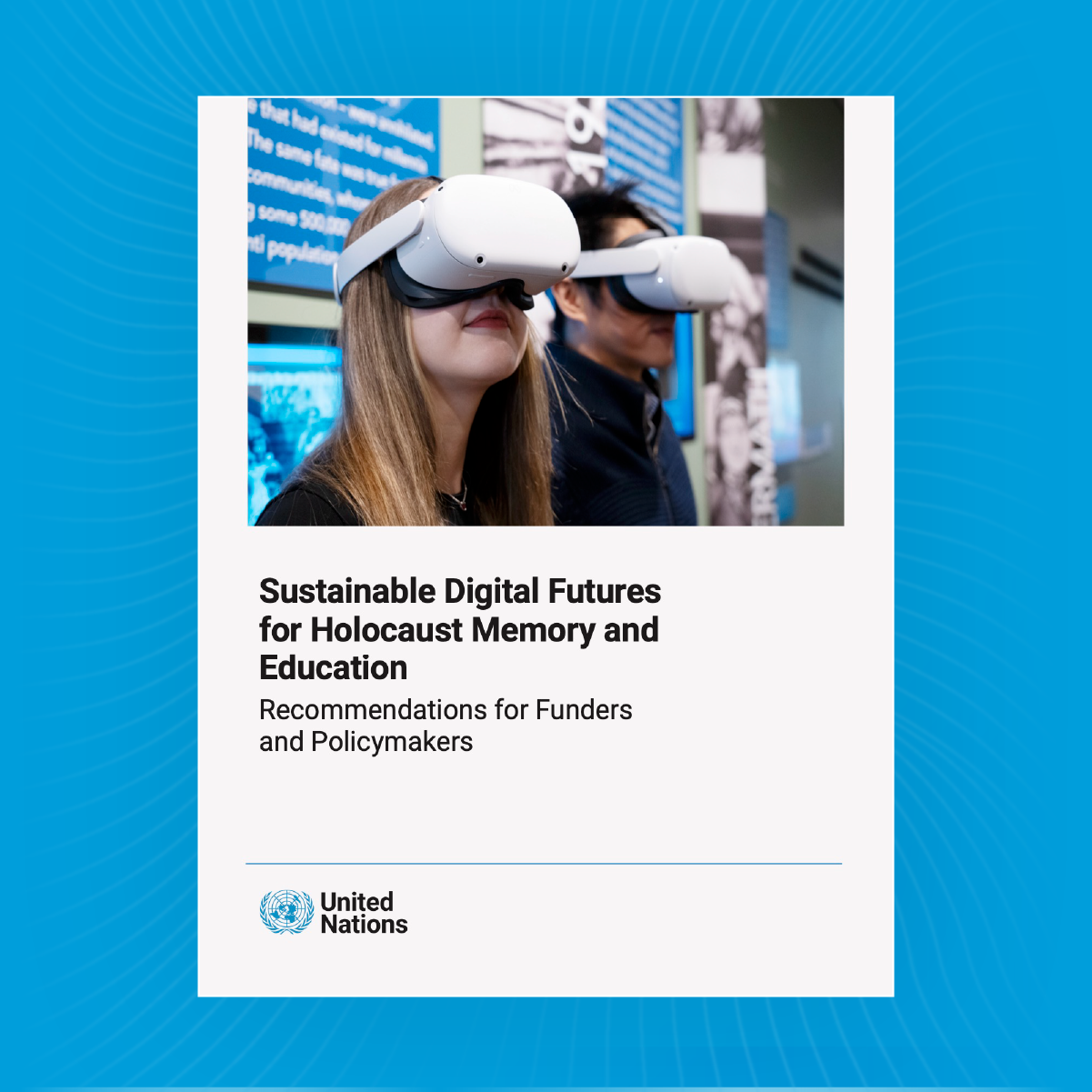
Sustainable Digital Futures for Holocaust Memory and Education: Recommendations for Funders and Policymakers
This report is the accumulation of ideas explored in a workshop, held at the University of Sussex in June 2024.
Abstract
Digital interventions have existed in Holocaust memory and education contexts since the 1990s. However, the term “digital” is still conceptualised, practiced and debated in both academic and professional circles as if it is a relatively new phenomenon.
The effect of this means that besides the very largest of Holocaust museums and memorial sites, few have coherent digital strategies, appropriate digital infrastructure, or permanent digital expertise amongst their staff. This trend echoes through funding and policy circles. Where international work has leveraged the digital, such as through the European Holocaust Research Infrastructure, this has focused on public access to archival metadata and academic research audiences rather than public memory and education. Where specific funding for digital Holocaust memory and education exists, it tends to be project-focused, providing short-term investments which leave institutions searching for further funds, or projects being abandoned due to a lack of support for maintenance and impact analysis.
To address this “sustainability crisis” in digital Holocaust memory and education, research has shown that interventions are needed at policy and funding, institutional, staff, and visitors/users level. This report focuses on policy and funding – a much-overlooked area in existing research. The report presents findings from a workshop organized together with the Holocaust and the United Nations Outreach Programme
at the University of Sussex in June 2024, which brought together representatives from major transnational and national bodies that support policy and/or funding for Holocaust memory and education including digital Holocaust memory and education. A future studies methodology3 was adopted for the workshop to encourage dialogue which built upon recommendations developed in previous participatory research workshops held as part of the Digital Holocaust Memory Project between 2022-2023.
Reflecting on the discussions from the 2024 workshop, this report offers a series of recommendations directed specifically at funders and policymakers regarding how they can support the sustainability of digital Holocaust memory and education.
Key Recommendations
Establish an Interdisciplinary, Central Advisory Committee
Funders could access the Advisory Committee to support funding bids for digital projects. The Advisory Committee would include a range of expertise from digital Holocaust memory and education more specifically, to broader skills in AI, digitization, computer games etc. The Advisory Committee would be able to support applicants to develop coherent and secure data management plans with a long-term view of supporting the project and impact analysis plans. The Advisory Committee would also support funders in their assessment of data management and impact plans.
Require that funding bids include plans for impact analysis, security, data management and long-term maintenance, and these are supported financially
Funding should offer support for skills, staffing and infrastructure development, experimentation, research, impact analysis and long-term maintenance. Grant application forms need to include technical and data management plans, and impact analysis methodology sections
in order to monitor, assess and support this.
Focus on Priorities to Ensure more Sustainable Approaches
Funders would do well to reallocate at least some funds away from short-term, small-scale projects to focus on priorities that would help
ensure more sustainable approaches to digital Holocaust memory and education. This could include:
» Dedicated research funding calls focused on identifying the extent to which digital technologies might call for new Holocaust pedagogies.
» Dedicated experimental funding focused on exploring the nuances, complexity and transnational connectiveness of Holocaust-related
collections, and the possibilities of using different digital technologies to emphasis these. Such funding would be free of the pressure
of producing public-facing digital outputs.
» Funding workshops or other supportive measures targeting smaller organizations, teams and projects to support them to design and submit funding bids.
» Funding bids aimed at the largest of organizations to support them partnering with a network of smaller ones to help build capacity
in the latter and develop formal mentoring programmes.
» Dedicated collaborative funding schemes to support Holocaust-AI literacies amongst users, possibly through school programmes
or teacher training. This could be a wider programme focused on historical accuracy and/or human rights, working with organizations
beyond Holocaust education to maximise reach.
Learn from Experience
The Holocaust memory and education sector, including funders, would benefit from knowing more about the experiences of those who have developed digital projects previously. There is a need to support a transparency of process, so that organizations and teams can learn
from each other. The Landecker Digital Memory Lab’s forthcoming ‘living database-archive’ will offer such a service.
Connect Similar Projects
Funders should use their unique position – in having access to a wider range of yet unknown project ideas – to maximise capacity by connecting potentially similar projects together. This would be further enhanced if funders communicated with each other, sharing
details about successful as well as unsuccessful bids and looking for ways to connect the latter where collaboration might make the projects more viable. This would of course necessitate a consent mechanism in the grant application process.
Employ Statutory Measures to Affect Change
Transnational and intergovernmental bodies should continue to encourage tech companies and governments to affect change through statutory mechanisms.
Establish Generative AI Platforms
Establish generative AI platforms, search engines or other digital platforms recognised for their historical specificity that could be adopted in global education efforts – this would be a major transnational project and would require support from multiple governments and funders.